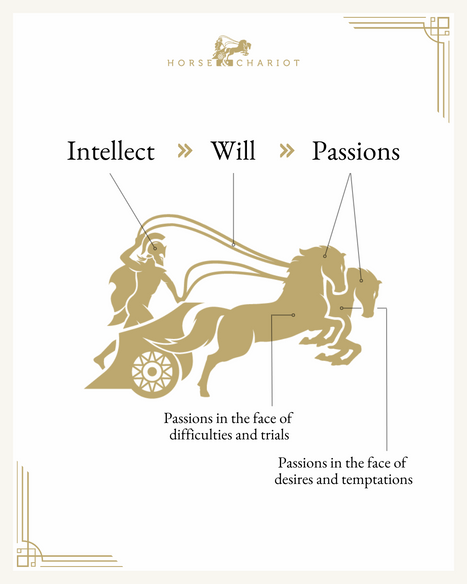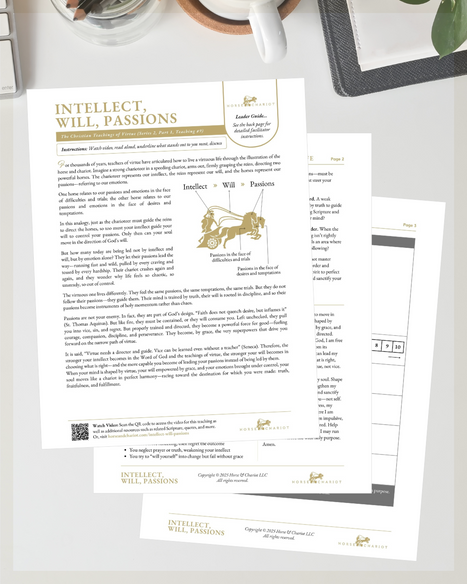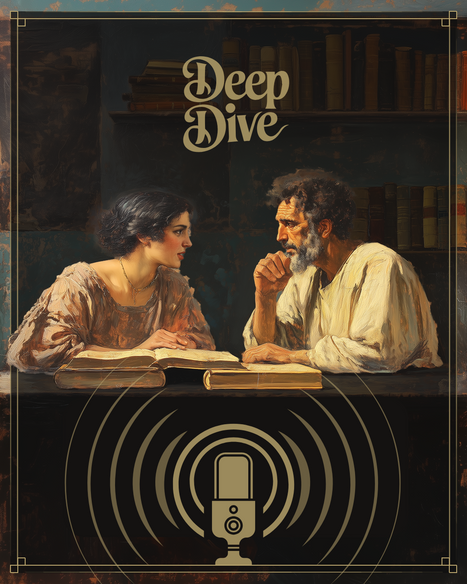All Series > Well-Ordered Soul > Part 1
Intellect, Will, Passions
(Series 2, Part 1, Teaching #9)
Watch: On YouTube
Intellect, Will, Passions
For thousands of years, teachers of virtue have articulated how to live a virtuous life through the illustration of the horse and chariot. Imagine a strong charioteer in a speeding chariot, arms out, firmly grasping the reins, directing two powerful horses. The charioteer represents our intellect, the reins represent our will, and the horses represent our passions—referring to our emotions.
One horse relates to our passions and emotions in the face of difficulties and trials; the other horse relates to our passions and emotions in the face of desires and temptations.
In this analogy, just as the charioteer must guide the reins to direct the horses, so too must your intellect guide your will to control your passions. Only then can your soul move in the direction of God's will.
But how many today are being led not by intellect and will, but by emotion alone? They let their passions lead the way—running fast and wild, pulled by every craving and tossed by every hardship. Their chariot crashes again and again, and they wonder why life feels so chaotic, so unsteady, so out of control.
The virtuous one lives differently. They feel the same passions, the same temptations, the same trials. But they do not follow their passions—they guide them. Their mind is trained by truth, their will is rooted in discipline, and so their passions become instruments of holy momentum rather than chaos.
Passions are not your enemy. In fact, they are part of God’s design. “Faith does not quench desire, but inflames it” (St. Thomas Aquinas). But like fire, they must be contained, or they will consume you. Left unchecked, they pull you into vice, sin, and regret. But properly trained and directed, they become a powerful force for good—fueling courage, compassion, discipline, and perseverance. They become, by grace, the very superpowers that drive you forward on the narrow path of virtue.
It is said, “Virtue needs a director and guide. Vice can be learned even without a teacher” (Seneca). Therefore, the stronger your intellect becomes in the Word of God and the teachings of virtue, the stronger your will becomes in choosing what is right—and the more capable you become of leading your passions instead of being led by them.
When your mind is shaped by virtue, your will empowered by grace, and your emotions brought under control, your soul moves like a chariot in perfect harmony—racing toward the destination for which you were made: truth, fruitfulness, and fulfillment.

Scroll down for the lesson plan and other related resources associated with this teaching.
Copyright © 2025 Horse & Chariot LLC. All rights reserved.
New teachings like this are released often. Subscribe free and never miss a teaching!
Resources

Visual Resource
Illustration of the horse and chariot and how it relates to the three parts of the human soul.

Free Lesson Plan
Perfect for small groups, families, classrooms, or personal reflection.

5-Minute Deep Dive
Deepen your understanding of this source teaching by listening to a brief podcast-style discussion (powered by Google Gemini).
Related Scripture
“Do not conform yourselves to the standards of this world, but let God transform you inwardly by a complete change of your mind. Then you will be able to know the will of God—what is good and is pleasing to him and is perfect.” — Romans 12:2 (GNT)
“Be obedient to God, and do not allow your lives to be shaped by those desires you had when you were still ignorant.” — 1 Peter 1:14 (GNT)
“Beloved, I urge you as sojourners and exiles to abstain from the desires of the flesh, which wage war against your soul.” — 1 Peter 2:11 (NABRE)
“We destroy every proud obstacle raised up against the knowledge of God, and we take every thought captive to obey Christ.” — 2 Corinthians 10:5 (NRSVue)
“For the grace of God has appeared, bringing salvation to all, training us to renounce impiety and worldly passions and in the present age to live lives that are self‑controlled, upright, and godly.” — Titus 2:11-12 (NRSVue)
“If they were wise, they would understand this; they would discern what their end would be.” — Deuteronomy 32:29 (NRSVue)
“Look carefully then how you walk, not as unwise but as wise.” — Ephesians 5:15 (NRSVue)
“Who has put wisdom in the inward parts or given understanding to the mind?” — Job 38:36 (NRSVue)
“Desire without knowledge is not good, and whoever makes haste with the feet misses the way.” — Proverbs 19:2 (NRSVue)
“A wicked person puts on a bold face, but the upright give thought to their ways.” — Proverbs 21:29 (NRSVue)
Related Quotes
“Faith does not quench desire, but inflames it.” — St. Thomas Aquinas
“Virtue needs a director and guide. Vice can be learned even without a teacher.” — Seneca
“Now Jesus Christ has all these passions (He is fully man), but He is in perfect control of each one. He perfectly loves sinners. He perfectly hates sins. He was perfectly angry at the money changers with the precise amount of anger needed and only for the precise amount of time that the situation required. Sometimes Christians can assume that being holy is to lack passion. They think that Spock from Star Trek is the ideal. Not so. This belief is repackaged Stoicism. Thomas Aquinas rejected this Stoic idea of the passions as incompatible with Scripture. God wants you to be a fully passionate person. Yet he wants those passions submitted to right reason. If you are becoming a saint, people should see that you’re rightly passionate about God and your neighbors. Your passions will be like a symphony under a masterful conductor.” — Dr. Taylor Marshall
“Reason’s job, with the aid of thumos, is to discern the best aims to pursue, and then train his “horses” to work together towards those aims. As the charioteer, he must have vision and purpose — he must know where he is going — and he must understand the nature and desires of his two horses if he wishes to properly harness their energies. A charioteer can err by either failing to hitch one of the horses to the chariot altogether, or by failing to bridle the horse, and instead letting him run wild.” — Brett & Kate McKay
“The law is reason unaffected by desire.” — Aristotle
“The greatest man is he who chooses right with the most invincible resolution; who resists to sorest temptation from within and without; who bears the heaviest burdens cheerfully; who is calmest in storms, and most fearless under menaces and frowns; whose reliance on truth, on virtue, and on God is most unfaltering.” — Seneca
“The beauty of the soul shines out when a man bears with composure one heavy mischance after another, not because he does not feel them, but because he is a man of high and heroic temper.” — Aristotle
“The intellect of the wise is like glass; it admits the light of heaven and reflects it.” — Augustus Hare
“It is our choice of good or evil that determines our character, not our opinion about good or evil.” — Aristotle
“The acquisition of knowledge is always of use to the intellect, because it may thus drive out useless things and retain the good. For nothing can be loved or hated unless it is first known.” — Leonardo da Vinci
“If there is some end of the things we do, which we desire for its own sake, clearly this must be the good. Will not knowledge of it, then, have a great influence on life? Shall we not, like archers who have a mark to aim at, be more likely to hit upon what we should? If so, we must try, in outline at least, to determine what it is.” — Aristotle
“Never, never be afraid to do what's right, especially if the well-being of a person or animal is at stake. Society's punishments are small compared to the wounds we inflict on our soul when we look the other way.” — Martin Luther King, Jr.
“Man, as an originator of action, is a union of desire and intellect.” — Aristotle
“The largest part of goodness is the will to become good.” — Seneca
“The truly good and wise man will bear all kinds of fortune in a seemly way, and will always act in the noblest manner that the circumstances allow.” — Aristotle
“True happiness comes from gaining insight and growing into your best possible self. Otherwise all you're having is immediate gratification pleasure, which is fleeting and doesn't grow you as a person.” — Aristotle
“We should every night call ourselves to an account: What infirmity have I mastered today? What passions opposed? What temptation resisted? What virtue acquired? Our vices will abate of themselves if they be brought every day to the shrift.” — Seneca
“World hinges on moral foundations. God has made it so! God has made the universe to be based on a moral law. So long as man disobeys it he is revolting against God. That’s what we need in the world today: people who will stand for right and goodness.” — Martin Luther King, Jr.

Never miss a teaching — get all new teachings of virtue sent to your inbox free!
